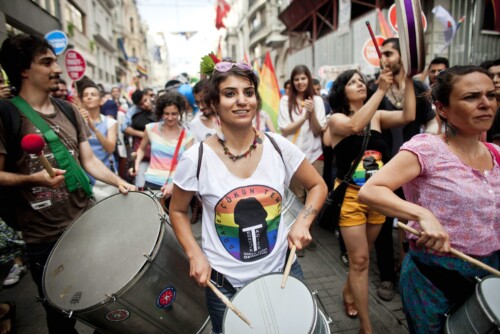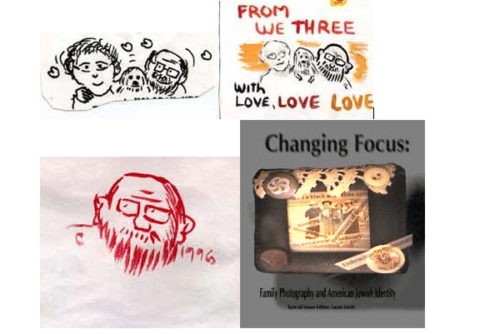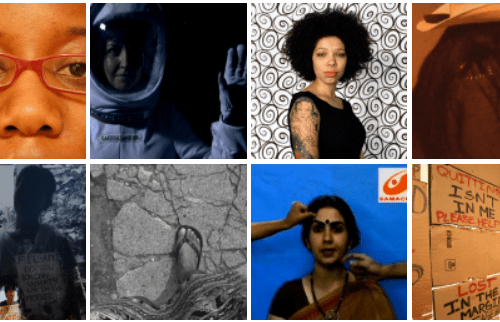Complicating Solidarity and Notions of the Transnational
Fatima: That question, “Who are you?” almost always stumps me. My brain freezes because our identities are transhistorical as well as transnational. Immediately, in my head, I go to how my life’s been scattered in many global and historical directions by colonizations and imperialisms and to my varied experiences as diasporic, and how it’s always re-shaping who I am, including in terms of what I do regarding my queer activisms. So in short, like the others, I have in mind all three of your questions as I answer “who are you?”
Dani & Daniel: It’s amazing what you say Fatima about your scattering in global and historical directions that have led you to a diasporic identity and constant reshaping of self. And how this, of course, then leads to what you do regarding queer activisms. That is something we related very strongly to! It seems to be a place from which to think for all of us—multiple diasporas. So then, as another starting point, how do we all define transnational? While the US context seems to have a very particular way of thinking transnational that can tend to fall into multi-culti conversations, what does it mean to think transnational from other loci of enunciation?
Karma: This is the kind of question that animated our desire to facilitate this conversation. For example when I was in Palestine in 2015, one of the things that struck me was that the concept of the transnational was only salient as it related to the struggle for justice and self-determination in Palestine. This is very different than what Dani and Daniel refer to, and it is also different than a kind of transnationalism that’s oriented around an issue-export model (i.e., gay marriage going global).
Ghadir: Over the past decade, we have witnessed a great deal of interest and solidarity from International Queers. In her book Israel/Palestine and the Queer International, Sarah Schulman narrates her own encounters, experiences, reflections, analysis and aspirations in relation to queer international solidarity with Palestine. Similar efforts have attempted to highlight the importance of global queer solidarity with all Palestinians, and not just with those who are queer-identified. And this is an important turning point in the history of the struggle of Palestinian queers in the international arena.
As Palestinian queer activists articulated a discourse around human rights and social justice, they urged internationals and international queers to be in active solidarity with all Palestinians, and not confine their support to Palestinian queers. Rights cannot be prioritized, divided or fragmented, and we as Palestinians deserve this holistic and comprehensive approach to equity and justice. Schulman’s book was timely: in addition to offering an expansive overview of the situation and its complexity, it urged for and allowed the involvement of queers, people of color and human rights defenders to organize actions in support of the Palestinian struggle. It also brought more attention and awareness to, and active solidarity with the issue of Palestine through the lenses of the queer discourse and the intersectionality of our struggle.
International queers mostly come with good intentions: they are eager to help, and offer their perspectives, experiences, theories and practices. This is great, as long as they are willing to let go of their assumptions and not engage in imposing attitudes and discourses beyond understanding the specificity of the local context.
When being in solidarity with Palestine, queer activists and academics have an ethical responsibility. Perhaps the most important consideration is to not cause harm – and by that, I am referring to actively seeking to understand the unintentional power dynamics and impositions that can be detrimental to our movements and contexts. The recent history of queer groups in our region has taught us that, very often, interventions by outsiders who do not possess a real sense of reality on the ground and who fail to take into consideration the best possible options for the locals can have disastrous outcomes. Another important consideration is to not be patronizing, listen to the local communities and hear their wishes and aspirations instead of telling them what they should be doing and how.
In the context of Zionist propaganda – including pinkwashing, many outsiders fall in the “Balance Rhetoric” trap: they condemn Israel’s occupation of Palestinians while praising its relatively progressive gay rights. In doing so, they fail to acknowledge pinkwashing as a propaganda tool used and abused by Zionist lobbies and agencies. In fact, pinkwashing serves to portray a false image of gay-friendly Israel, and divert international attention from its occupation, settler colonialism and apartheid regime.
Hana: Whereas the transnational serves a very particular function in the case of Palestine-Israel, in other instances, like that of China, the utility of the concept of the transnational itself comes into question.
Di: The idea of a queer or feminist movement in China is not very transnationally known at least not until the detention case in the spring of 2015. I feel like we take in a lot of information from global feminist or queer movement. We know a lot of things that are happening, but we don’t have that much impact on the transnational atmosphere. And sometimes when the global mainstream media cares about feminist activism in China, I think they care more about China than feminist activism. Like they will care about the government or authorities because it’s newsmaking, but not really the feminist or activist part. We worry about whether we are even national enough. China is so big, we have people in major cities but how far does feminist activism really spread outside those cities? There are always so many issues, but not enough people and resources.
But we are aware of groups like Pussy Riot and Femen. There are some transnational interactions for solidarity. During the detention in March 2015, Femen did a solidarity picture in which they wrote “feminism is not a crime” on their chests in Chinese. It is really cool how they supported the movement in China. But I still think we take in more than we spread out.
Fatima: I too have a problem with that word transnational. Transnational as a position privileges mobility as indicative of agency. I fit transnational in the sense that to some extent my migration to Canada was agentic. I could possibly use ‘transnational’ in terms of myself, doing work as a transnational queer. But in talking about how I came to be in Kenya, or in terms of other members of Trikone, it’s not necessarily the term I would use.
When I read Ghadir’s piece it impressed on me how differently we organize in different parts of the world on the same issue, how many different geographical factors come into consideration. It reminds me of South Africa back in 1994 I was a journalist working for the women’s movement. I was sent there to work on a feminist magazine, Speak. In the evenings, I’d hang out with the feminists and queers at parties celebrating the first multiracial elections in South Africa. Celebrating was, in fact, a big part of the strategy they employed to defeat apartheid, I learned. It’s very queer, actually, this strategy of coming together and celebrating every little victory, which we don’t do enough here. And at these parties, they would order Heineken and Coors, and I would wince because, in Canada, as part of the anti-apartheid BDS [boycott divestment and sanctions], we boycotted those beers for the solidarity cause. So I couldn’t do it, I had to order the local beer. They would laugh at me and that’s when I found out they had boycotted local beers because it was part of their BDS against apartheid in South Africa. So there I was, shunning the American stuff and drinking local beer, and they were drinking the American stuff because they were boycotting the local beer. We were part of the same anti-apartheid struggle but some specifics differed because of being located in different contexts. This is only an example of how we must negotiate so many things when we work in this transnational way; but those different paths we take must always be informed by how to build respectful solidarity. Needless to say, in South Africa, I stopped drinking that local beer; in Canada, I went back to avoiding those offending American ones.
A more pertinent example is that despite my strong identification with where I come from, with Kenya, I sometimes take certain positions that aren’t necessarily going to be ones that queers in Kenya might take. In Vancouver, I balance being Kenyan with my locally-predominant political identity as South Asian. So I facilitate as a South Asian the group called Trikone Vancouver because of the context in which I live. It’s much harder for me to work as an African queer here because I’m seen only as South Asian. Of course, I also do work with other racialized communities, including queer African ones, but I have come to recognize I’m most useful locally as South Asian. This is not to say I and others are not challenging these narrow essentialisms. We are changing it slowly but it’s strategic when we do it, a kind of strategic essentialism.
Ryan: I’m both skeptical and excited by global or transnational queer organizing. I do my best to situate my work locally where I am, especially when I am in Maine. There is this assumption that queer life is easier now in the US because we have gay marriage, gays in the military, and gay people are on TV. But outside of major urban centers, the lived experiences of queer people, often living in isolation and precarity if not poverty, hasn’t improved enough. There is this attitude that most social problems have been solved and that, for example, you have to go to Africa to fight AIDS. It’s as if all the problems have been displaced to somewhere else and those of us still fighting these battles outside of major urban centers have been forgotten. But I also have great excitement and hope for queer internationalism. Being privileged in so many ways by being born in the US and now living in Canada I feel it is my responsibility to both confront my imperialist governments from inside the belly of the beast, but to also collaborate on as even footing as possible with queers struggling under the boot of my government and their own along with the corporations that often supersede them. I guess the question that lingers for me as I collaborate with friends in Australia, Canada, Palestine, Kurdistan, and Russia is how to collaborate in ways that don’t reproduce a colonial or imperialist relationship. From how we conceptualize queerness to the language we use to describe it. I don’t have the answer to these questions, but it’s part of the ongoing questions I ask myself while doing this kind of queer transnational activist work.
Karma & Hana: Ghadir, Fatima, Di, and Ryan speak from very particular locations, even as those locations are complex and diffuse. This seems to lead them to a different relationship to the transnational than that of Dani and Daniel, who engage with it from a more untethered, shifting place.
Dani & Daniel: Working with Pocha has very much influenced the way we think about the transnational. In every context we work in, we strategically highlight particular parts of our identities to provoke and engage in different dialogues and exchanges. What does it mean to be a pocho? As a pocho, you’re never quite enough in any community, you don’t quite represent everything that different communities want you to represent, and that’s the story of our lives. To be someone who has this super hybrid identity where you don’t feel what is home. What does it mean to have a mother tongue? Dani speaks four languages, I speak three. Where do we choose to live? What are the communities we’re looking for when we choose these places to live and why? Basically embracing and working from multiple levels of impurity—racially, ethnically, nation-state—where we are belonging to and why.
Understanding of “Queer”
Di: Queer is translated into Chinese by its sound, so it spells Ku Er in pinyin. Way before “queer” came into Chinese words, Ku Er was a brand of orange juice (bought by Coca-Cola) in China. It is represented by a little figure in blue, genderless and almost always flexibly transforming in all shapes. It is good at sports, about 7 years old, likes to hang out in parks and dives into fruit juice on the TV frequently. The only word it speaks is Ku/Qoo/Cool. This is what queer/Ku Er meant to me as a teenager. When discussing queer, fluidity, sexualities, identity politics, etc., a question I like to ask people in China is “does liking drinking orange juice make you an orange juice person?” This accident of sharing sounds and characters between orange juice and queer has been a useful tool for me as a workshop coordinator in China. But the commercialized comical and cute images of Ku Er also potentially make queer depart from its injury and its political power of reclamation. Later, according to rumors online, when Coca-Cola discovered this accident of translation, instead of celebrating it, the industry decided to drop the label from the market and Ku Er orange juice disappeared from China. This might not be completely true, but the story of Ku Er and its “failure” seems to be a metaphor for queer actions in China. Once you make yourself or a concept visible as a center that is materially and/or discursively productive, it is time to disappear. Either the concept will be censored or you will be. Maybe it is because of this, being “radical” has very temporary components for me. Or simply, the reliable means of a movement’s survival have to be changed all the time. This constant readjusting and relocating speaks to me as queer politics.
Hana: That departure from the injurious connotations of the term queer in English resonates with what I understand to be the complexities and potentials of translating “queer” in Latin American contexts. Brad Epps gestures toward a sort of simultaneous enthusiasm and reticence toward the term, precisely because of its divorce from the particular history of the slur 1 . But—as Di mentions and as Epps, too, suggests—that disarticulation has various potentials, as well.
Dani & Daniel: Inmiscuir is the name of our recent collaborative performance. When we first came across this word we liked it because it had queer in it, and queer as it has been appropriated in Latin America, “c-u-i-r” so thinking about how queer travels from the q to the c. And so we looked it up and started asking friends, and it turns out it has kind of a negative connotation like “no te inmiscuyas en mis cosas,” meaning “don’t nose into things that aren’t for you, it’s my business, don’t go where you’re not called.” But at the same time it also means different subjects, mezclando, getting mixed. So it’s got both sides: On the one, things getting mixed up, and on the other, the negative. We’re like oh wait, that’s exactly what we’re doing also. And that’s an interest of ours, testing different possibilities within communities that aren’t the easiest ones to maneuver. So when we’re going around in communities that talk about difference but are all the same, and also transnationally, when we go to these festivals, it’s often the same people in the program. We’d like to go in where we shouldn’t, but also invite others who may be attracted to us or what we do for different reasons—gender, pedagogy, aesthetics or others. When we first performed this piece in Lisbon, we were worried that it was too specific to a transfeminist context/lens. But it turns out there were lots of hetero couples in the audience that got a lot out of it because it also speaks in a broader sense about partnership, love and constructing/deconstructing what it means.
- Brad Epps, “Retos y riesgos, pautas y promesas de la teoría queer,” Debate feminista 18, no. 36 (2007).[↑]


